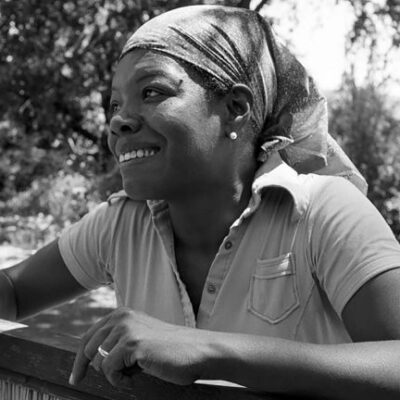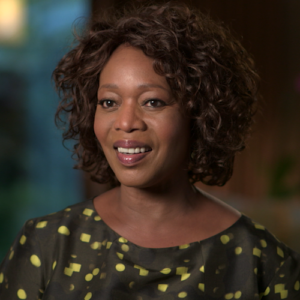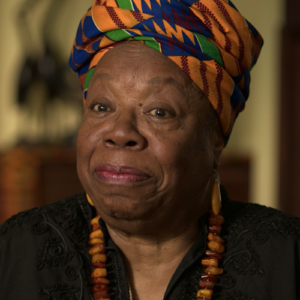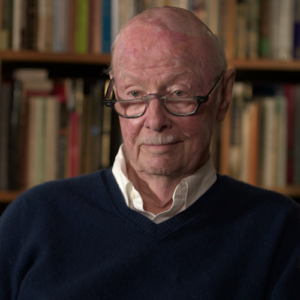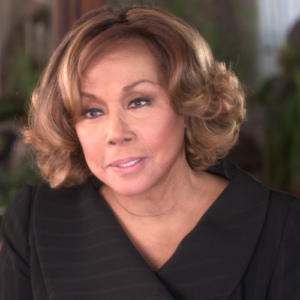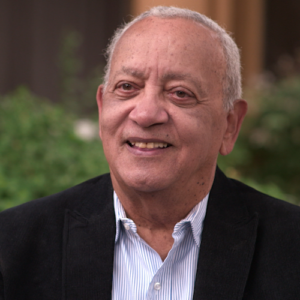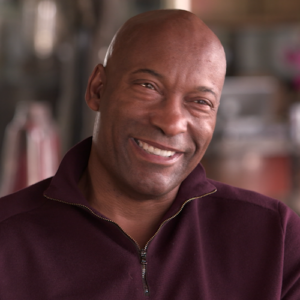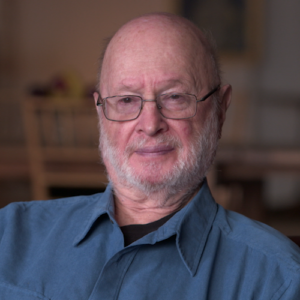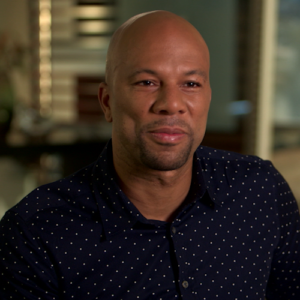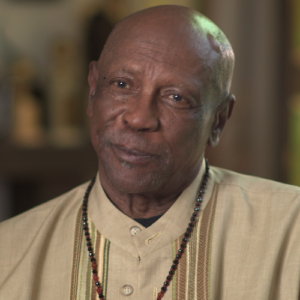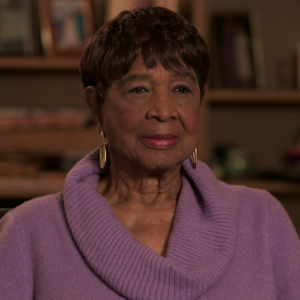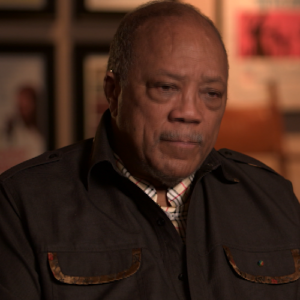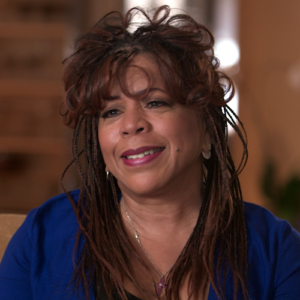Speaker 1 What we want to do is start off by going back to some of your earliest memories of your mother. Yeah, that’s back. That’s back quite a while. Is there any scene or picture you can paint of an early memory of your mother?
Speaker 2 My mother to me was. She was tall. And muscular. But that’s not what I remember most when I think of a childhood memory is I remember walking down the street with my mother and she would be wearing African garb and her hair was natural. And I was about eight or nine. And we would play not. Don’t step on the cracks. But truthfully, what I mostly remember about my mother is in school the fact that she would come to school. Wearing her African clothes and her hair natural. And some idiot kid in the class would say, Your mama from last Africa, and I’d have to pop him. And generally, he was generally bigger than I was. So I would take the most of the beating, even though I would start it. And then I would come home and I would ask my mother, I remember this. We had this. We would laugh, we laugh about this. I said, Don’t you have a sweater skirt outfit? Don’t you? Can’t you do one of those Penney’s things? And she would say to me. This is your history. You come from kings and queens. As well. And I would look at her and I would think, yes, it’s unfortunate. My mother’s demented. It’s it’s really too bad the old girl has just lost it. But I didn’t know she was a pioneer then. I didn’t know what she saw. The future. Because I was a prisoner of the media and the ignorance of the time. I didn’t know where the truth was. And so she was. I used to think my family was right. My family would say. Hi, Mom. Crazy boy. A mama. Crazy. I like to see crazy. And I would have to think they were right. And but fortunately, life has shown that she had the right vision. And as cinema, ITV says. A good human being is not a prisoner of their time.
Speaker 1 Lovely. Wonderful. Oh, okay. You said that your mother taught you to be independent even at an early age. Can you give me an example of how you were taught to make your own decisions?
Speaker 2 My mother gave me the right. To challenge and argue any decision provided. I was polite. And I brought new information every time I raised the subject. And I think that’s the key.
Speaker 1 But how did you get that information? What did you have to do to get it?
Speaker 2 Well, most of the time I had to use my imagination. Sometimes I lied. But the reality is that what she gave me. Was this sense of myself. The sense of who I was. And that I was important enough to be listened to.
Speaker 1 Not. I think she told me I’m trying to get the story right, but I think she told me once that she did not believe in corporal punishment. Had a point because you. Would be able to talk about it.
Speaker 2 Well, what happened is I think that this is I don’t really remember him, She says, this is what I said, that she smacked me one time. And then she says, I hope you don’t have anything more to say. Of course, my mother didn’t know who I was at that time, and I always had something more to say. So I said to her at the time, Well, I said, Yeah, I have more to say. You’re too. You’re too big to be hitting me. And she took that to heart. And I think the last time I got smacked, I was seven or eight, I don’t remember. And then she took to talking me to death after that. So if I did something wrong, she would want to sit down, have a cup of coffee or a drink and say, Do you really think that a human being with any integrity and any sense of himself would do such a thing as you’ve just done? And we would talk about it for so long that finally I would say things like, Mom, just hit me. Please, please. Because. What she required was some thoughtful answer that gave some sense of either my lack of sense or my lack of thought.
Speaker 1 Describe growing up with your mother and your grandmother in that. Sometimes your mother wasn’t there, so was your grandmother with a similar or different in what they taught you?
Speaker 2 They were totally different. My grandmother’s attitude about things was, As long as you’re doing what’s right. And what you think is right. You’re doing what you’re supposed to do. And my mother. Oh. What’s more politically involved. She was more concerned with justice. And see, my grandmother and my grandfather were basically. They weren’t gangsters, but they were close to it. They carried guns. And my mother is not into guns or she wasn’t at that time. And. There’s no harder reality in my grandmother’s life. They came out of a time. That was fraught with hate and racial segregation. So they had a different perspective. My mother’s attitude was all humans have something in common. And so her friends were from everywhere. And while my grandparents weren’t racist, most of their friends, 99% of their friends were black. But my mother’s friends came from everywhere. So I got a whole different perception from her.
Speaker 1 When your mother. Mary Todd. Stay there. Both of your lives changed. And your mother said to me that Vivian Baxter was not initially pleased that she was marrying a white man and race relations being what they were at that time. What did you think of Tosh?
Speaker 2 That was my mother’s choice. Wasn’t mine, but he was a decent person. He played saxophone. Not particularly well. But he got me interested in music. They lived at at Hunters Point at the time I was eight and Hunter’s Point was all black and just. What are those metal? Quonset. We lived in a Quonset hut. And what his point was. One of the roughest areas.
Speaker 1 Explained Quonset.
Speaker 2 Quonset is that rippled round half shaped building that came out of World War two Metal and uninsulated. As I recall. And Hunters Point was the roughest area in San Francisco. Fillmore and Hunter’s Point were the areas if you wanted life action. And we lived out there then. And so having a white father man, I did a lot more fighting. I hesitate to think that that’s my personality. I rather think it was the circumstances that I was in, but it seemed like I fought a lot. But then again, I had a mouth that wouldn’t stop. So that often led to fights. And then, of course, my mother was always the strangest person on the scene, and that gave it some difficulty.
Speaker 1 What did you think of Tosh?
Speaker 2 And I liked him. He was all right. I mean, I could talk to him. He was. He was nice person. I don’t recall my grandmother. Disliking him. I don’t recall her not liking him because of who he was. Strange. Trish had his own. He walked to his own drummer and I appreciated that. And my mother appreciated that because she certainly had a drummer beating a different tone for her and a different rhythm.
Speaker 1 You mentioned that your mother’s son all the time around the house and you learned the songs. Your mother tells the story about performing at the Purple Onion and inviting the family and you being there. You had a classic child reaction to the song. I don’t know if you remember that story. You may just remember.
Speaker 2 I remember the story. I don’t remember so much the doing, but what I remember is going to see my mother and my mother pointing me out and saying things to me on the stage like, you know, Is that your third soda? All right. You know, things like that. But no, she would she would talk to me from the stage. But when you hear a song 10,000 times. It’s hard not to sing along with it if you know, if you can remember the words after 10,000 times, you know, and generally you do. It was That’s not my first memory, though. My first memory of seeing my mother is my mother. I was going to come out and Mort Sahl came on stage and it was like quarter of nine, nine feet, you know, something early. And there were like ten or 15 people in the place. And Mort Sahl. First words were, Don’t worry about it. Hitler started off with a smaller crowd than this. That was my that’s what I remember about Mort Sahl. But then she did something with Phyllis Diller, and I can’t really remember Phyllis Diller, but I do remember Lenny Bruce. Lenny Bruce, His mother came out on stage. My mother wasn’t due out for a while and she told the dirtiest jokes. I think her jokes were almost as dirty as my grandmother’s. My grandmother told dirty jokes to me all the time. But then Lenny Bruce came out and who thought he could be filthier than then? The woman who preceded him. And he was. But he was funny. He had me laughing. I thought he was the most amazing comedian. Most amazing. I really liked him.
Speaker 1 Was all of this at the purple?
Speaker 2 No. There’s so many places my mother played. I can only remember two of them. Mr. Kelly’s purple onion. Oh, the hungry eye and the clouds in Hawaii. Those are the only ones I remember. I don’t remember any of the ones in L.A..
Speaker 1 Your mother had this opportunity to become a dancer and to travel to Europe. And she describes that you two shared a once a week call and often ended up crying on the phone and her finally deciding to come home. What do you remember about that time or those phone conversations?
Speaker 2 Just that she was gone a long time. I don’t remember the phone conversations. What I recall is that. She was gone. And. I don’t really remember her being gone for that long, ever before or afterwards. My grandmother was fantastic. And. Well, my grandmother was not my mother. You know, and the lives we lived were so different. You see, from the time I’ve been, I was a reader and I don’t know when I started reading, but I finished my first adult book when I was about eight. It was called The Fires of Spring. But my mother and I used to read we would read science fiction fantasy. We would read all these sorts of things. And anything she thought I could read, she passed on to me. My grandmother was not a reader. She was a doer. So, you know, she would take me into to the kitchen and teach me how to cook and all of those things. But the thing that I have loved all my life is reading. And my mother introduced me to that and to share things with her. Was the ultimate. So when she wasn’t there to share. And when we get new science fiction things and there was no. Did you read this story? What do you think of that that had added that? There was none of that? And I miss that.
Speaker 1 And apparently she missed it, too, because one of the things she said to us was when she came home, the reunion was so sweet. That she came home and there you were. She also tells the story of a time with. I’m thinking of Wilkie. I had to help her because she tells this story all the time. She tells it in the book and she told it on tape to us where she had to ask you to stay in the house and she felt like she might have harmed you or herself. Do you remembering this story?
Speaker 2 Not at all.
Speaker 1 Because she felt like I’ve got to raise a black son. And I don’t know what I’m doing at this point. And she went to see a psychologist. Two walked up to the place, demanded to see somebody and asked for help. And they didn’t understand what she was going through.
Speaker 2 That’s a maternal story. I ain’t got anything on that. What I do know is that fed with Milk, Wilkerson was her voice coach and he would have her singing notes all day long. But Frederick Wilkerson was around at the same time. Billie Holliday was around. And I have much better memories of Billie Holiday. I mean, I recall her more clearly and more defined than I do. Frederick Wilkerson.
Speaker 1 Well, tell us about Bill.
Speaker 2 Well, we lived in Laurel Canyon, and we had about ten acres for a backyard, and we had a massive Rottweiler that weighed about £125. My mother would go to work every night about 830. It would take her about an hour, an hour and a half to get to work, because Laurel Canyon is not exactly in the middle of the center of things. And she would have please be singing Redondo Beach, you know, I mean, places that were drives away. And she would leave about 830 and come home. And then one time she came home, she came home with Billie Holiday and Billie Holiday. I knew her music because we played Al Hablar, we played Billie Holiday. We played all the old singers of the time. Jesus. The names allude me. But when she brought Billie Holiday home, Strange Fruit was the huge song at the time. And. I asked her to sing it. And she sang it for me. And. It’s a song that tugged at my heart, particularly when my family was able to, and they explained it to me what it was about. But the other image I have a Billie Holiday, was her dog drink, too. Billie used to come with a bottle of whatever she drank. I don’t remember what it was, and she would pour a shot of it for her little Chihuahua. Whatever it was, it was in the show, but it was some miniature dog. And it used to really astound me that the dog would just be lying there hiccuping on its side. You know, I thought it was a drunk barking rat is really what I thought. But, you know, I never said that to her anyways. But for me, what it was, is that she was a tragic figure because my mother would tell me after she left that she had been used and abused, and part of her angst and sadness had to do with the things she experienced in her life. Well, Billie was really my first exposure to people who had been using drugs and had been in that part of the life. I didn’t know at that time that other members of my family were also traveling that path. But she was my first exposure to it.
Speaker 3 Wasn’t there an incident that happened then where she came into your bedroom? Billie Holiday and. Your mother describes it in the book that you get upset about something.
Speaker 2 I think, you know, I don’t I think the only thing difference I had with Billie Holiday was Billie Holiday coerced considerably and coerced a lot and left this. And so be that and all of that. And quite frankly, in my family, when people started cursing, generally people get shot. So cursing was generally an indication of violence to come. That’s the way I saw it. And so I didn’t like it.
Speaker 1 When we talk about this San Francisco transition, there was a time when I think it was like there was a kind of little commune that you and your mother were living in. Is that right?
Speaker 2 No. You’re thinking of Sausalito. When we lived on the houseboat. We lived in a houseboat when I was ten years old. It wasn’t exactly a commune, but it was a community of artist Yanko Varda, the painter who lived next door. Allen Ginsberg lived on the other side, and the rest of the people were musicians and writers and stuff like that. I don’t even remember. I think Kenneth Patchen now, he wrote the Journal of Albion Moonlight. He I think he was among that group there, but it was just writers, painters, people who filled my life. Ever since.
Speaker 1 When you move to New York. Big change.
Speaker 2 Well, see, first off, we moved to New York several different times. First time was when I was seven. That’s when we met Max and all of those people, Max Roach, all of those Clifford Brown. Charlie Mingus. Julian Priester I can’t remember all of them, but most of them are probably considered jazz greats. Eric Dolphy. John Coltrane. I can’t remember all of them. But if I listen to their music, I’ll tell you.
Speaker 1 So when you moved the first time, you were how?
Speaker 2 Seven.
Speaker 1 Okay, so. That’s right. You move there. Move that. I make it the pronunciation wrong.
Speaker 2 But Markie consumes you, Marky. Oh, okay. He was a South African freedom fighter. He worked for the Pan-African Congress PSC, and the PSC was the more, shall we say, progressive and radical wing the ANC was, the less pressing wing. Of course, history shows who was on the right road. But at that time. This is skipping all the time with Dr. King and the Southern Christian Leadership Conference. Is this what you want to do?
Speaker 1 Then let’s go there first before we get to Mike.
Speaker 2 Yeah, because he’s at the end of that.
Speaker 1 Okay. All right. So take me there.
Speaker 2 We moved when we moved to New York. My mother was initially singing, and I got to tell you this story because this is the story that my mother had a chance. To do the understudy in. Hello, Dolly. With Pearl Bailey as the lead. Yet. For my mother, it meant living in New York without leaving it. Living continuously in New York without leaving me for at least a year. And it was regular money. The director and the producer both loved her. But Pearl Bailey came back and saw my mother and said, Oh, no, I ain’t. Go have this big old ugly girl be my understudy. No can have her. There are very few times in my life that I remember my mother crying. It broke my heart there, crying in her room because this meant she had to go back out on the road, back out and find other work. 35 years later, when Pearl Bailey was getting a lifetime award and they ask her, Who do you want to give it to you? She said by Angelo. And guess who gave it to her? Never said a damn thing. Sorry, This just took me back to a time so long ago. For my mother. She was not dead famous. She was not who she. Became. It was devastating. It was devastating. And I knew it because I knew all the sacrifices my mother made. They keep me with her anyway. So you see, when my mother would go out of town. Godfrey. Cambridge. Roscoe Lee Brown. John Killens. Sam Floyd. They’d come for me and ask God for Cambridge is driving a cab. At the time rascally was Brown was working as a waiter. They’d come for me and sometimes I would eat. I’d eat over at the restaurant that Roscoe Lee Brown was. I’d go and ride around in the cab with Godfrey Cambridge or John Killens. You know who John Killens is? John Killens. I’d go over and stay at his house with his son, Chuckie, and his daughter. So my mother made a lot of plans when she left town. And it always required a great deal of coordination and everything. So for her to have been able to be able to stay for six months would have been a dream. You know. So anyway, so I know that was a big heartbreak for her with. Pearl Bailey. And, you know, after that, I hated Pearl Bailey. I couldn’t help myself. But after that, I don’t really know how she got into it. But she met Dr. King. I don’t even know how. You’ll have to ask her how she met Dr. King. But all I know is that she got the job with the Southern Christian Leadership Conference in Harlem. And it was a crazy time in Harlem. Mr. Michel’s bookshop was on 125th. He’d have 500 people out in front of his bookshop as they’d be talking. And I didn’t know it was the precursor to Malcolm. I didn’t know that nobody really heard of Elijah Muhammad in those days. He was just rising. And so I remember. Castro came to town and he stayed at the Teresa Hotel to race in Harlem, which is like for No. Two and a half blocks from the Southern Christian Leadership Office and about three blocks from where Mr. Michel’s bookshop. So it’s right in the middle of everything. So, of course, my mother gets to meet them. And that’s where we met Carlos more. Do you know who Carlos More is? That’s when we met Carlos More during those times. And. It was an amazing period. I was in a thing called the Human Relations Club in high school, and my mother said to me, If you really feel that you have something to protest, you should be on the streets. You should be on the streets. So I joined the Corps. Then we were doing a lot of the anti nuclear stuff at the time. So I joined Same and I was a member of the ACP. But the year that we went down to work on part of the SNICK constitution, the NAACP was red baiting. So we had a student walkout of the ACP National Conference. Boy one time’s.
Speaker 1 Exploiting for our younger audience with baiting.
Speaker 2 OC red baiting as when we were just coming out from under the shadows of the House of un-American activities. And so being a communist was a terrible thing, probably the worst thing you could call a person. And it had nothing to do with the philosophy. It was just, Oh, those are the enemy. And so when they went after people who were communist in the in the ACP. It was. It was antithetical to the NAACP. Come on. It wasn’t only colored people. It sounded like they were making it for certain people. You know, so we walked out and it was during this time my mother left the demonstration after Lumumba was killed. And after that demonstration. I wasn’t with her on that. I was once she went to the United Nations. The one I was with her on. And I’ll just want to tell this story. I don’t really remember what we what the actual issue was, but we were protesting the. The damage being done to people in the South who had gone down there for the Freedom Rides. And in those days, if you had a march, you needed a parade license. And if you didn’t get a parade license. The police, mounted police would run you down. And they did this a number of times. My mother was leading this demonstration and I was with her and we had about 400 people, maybe five, and we were marching. I don’t really remember where we were marching. I think we were somewhere in Harlem. And three blocks away, the mounted police pull into the street. Information and they come not at a trot, but at a walk toward us. People in the demonstration began going to the sidewalk. They got about two blocks away and about half the people were gone. And I was looking at my mother and she kept on and it was about a block, maybe a block and a half. And I said, Mom, let’s go. She looked at me. We kept walking. Not a block. I said, Man, come on, let’s go. But yeah, they they entered the block. We’re about a block from us. And I said, Ma, come on. He’s going to get us killed. Let’s go. She turned to me and she said, One person standing on the Word of God is the majority. I looked at her and I thought, You really have gone crazy. You got crazy. That’s what I was thinking. But because my mother was there, I couldn’t go anywhere. I was forced to stay with her. So we kept walking. By the time the police got to us, there was probably eight or nine people out of the 400. Behind us. Because there were only eight or nine people. They the police walked past us. They started to walk past us. The sergeant in charge started with walk past. My mother pulled out this big hair, peered out of the out of her headband and stuck it in the sergeant’s horse. The sergeant’s horse made a weird up. The sergeant fell off. The police went in chaos with the sergeant off. You know, they are, you know, people jumped off their horses. The people came back from the side off the sidewalk, and we finished that March day. And Zeiger. It’s like that right up to my face. Because in those days they ran over people. They stopped them, trampled them and left their bodies in the street. She took me on a trip or two, taught me a little bit about courage. I have it in my heart. Carlos Moore called me yesterday, two days ago, and said he wanted to do a story about Negritude, Pan-Africanism and the civil rights movement. And there was only one person who was in the middle of all three. It was my mother. When I think of where she put me, what she exposed me to. I know that I loved the blessed life.
Speaker 1 I don’t know if we’re I know we’re not quite finished. We can’t move to here because she told us how she met him. Speeches. She went to see a rally from the bookstore into a rally.
Speaker 2 But Mr. Michaud is bookstore. Yeah.
Speaker 1 Now, then. When she goes to work for him. Right before that, he’s. This is with April 4th.
Speaker 2 But the first time she worked for him was the most majestic time, because it was when Dr. King was at the height of his powers. And he had charisma that you could feel. It was palpable. You could feel him enter a room. He could feel it. He was a human being. And so we can’t put him up on a pedestal. But damn, he was a hell of a human being. Amazing. Amazing. Only God could create such a thing.
Speaker 1 Did you have interaction with him through your mother?
Speaker 2 Well, I met him perhaps 30 times. But I was a kid, and. Had the attention span of a kid. I didn’t understand who it was. You know, I didn’t understand who I was or who my mother was.
Speaker 1 When he was assassinated. She took it very, very hard. Were you around her at that time?
Speaker 2 Yes, I was. She was living. And what’s. B Richards was living in front and Francis Williams was living in back. Those are both actresses. It happened on our birthday. What can I tell you? It tore a gaping red in the fabric of our lives. You see what made it worse? Or she had come home to work for Malcolm X. And he was killed five days after she returned to the United States. So for Dr. King to call her back. To the task. And for him to be killed a week later or two weeks later was devastating for me. I had two heroes. Just before Mandela rose to the heights he had. But Malcolm in the. Dr. King. They were my heroes. They were the people that I would have looked to. To lead. It was destructive.
Speaker 1 You mentioned that Malcolm X took time with you. Tell me about that.
Speaker 2 I met Malcolm X in Guyana. And see, truthfully, when I met him, I met Muhammad Ali at the same time because they met at my mother’s house for the first time since Malcolm left the church of Elijah Muhammad. And what made it so interesting is when we were in Egypt, I knew Akhbar Muhammad, who was Elijah Muhammad, youngest son. He was going to school in Giza, the University of Giza. So I knew him. And so when I met Muhammad Ali, his manager was the older brother of Akhbar. I don’t remember his name. But the day that they were going to meet, my mother went out and bought about six chickens and she rarely fried chicken, man, but she fried chicken that day. And I was almost sorry to meet Malcolm X and Muhammad Ali because the chicken was so good and I had to share it with them. But the thing about you see, I never really talked to Muhammad. And he came in and he said, his boy is almost as good looking as me. And he kept on. But the thing about Malcolm is, is if you asked him a reasonable question, he gave you a reasonable answer. It didn’t matter who you were. And that thrilled me for a person of his stature, for me to ask a question. And for him to think about it and then come back with an answer. Captured my heart. Captured my heart. Really did. And his answers were so phenomenal. He had a way of. Talking about what was happening around you and applying it to his answer. It’s something my mother learned.
Speaker 1 You were about 16 at that.
Speaker 2 18 and Garner 16. And Egypt 18. And Garner. You know, we didn’t really talk about Bruce sort of skipped over him. One of the things about Bruce was.
Speaker 1 It just seems like he’s.
Speaker 2 You know, one of the things about the Susie McKay was that he was very committed to the. The struggle. But he was unfamiliar with the struggle. Of the freedom of women and freedom of children. So when he said something to me, he expected me to. Kowtow and do as you said. Well, that was sort of difficult because if I was willing to stand up to my grandfather, I was more than ready to stand up to his smirking. And it posed a few problems for him. But we worked out an understanding. I would tell you one story about him. When we lived in Egypt. Do you know what a premise is? It’s a burner that you have to pump up, and then once you get the fumes under pressure, you light it. My mother had three of these. We didn’t have a stove in Egypt. We had a very small refrigerator. She was required to cook for the ambassador of some country and only remember which country. But at that time, when we lived in Egypt, we knew all the ambassadors and for Mark, because he was a freedom fighter, would go to raise money to some of these places, to some of these embassies, and then he would be required to invite them for dinner. So my mother would we would prepare five or six course dinner on these three burners, but you’d have to take you couldn’t even put a big pot on them, you understand. So she was going to have this just the ambassador and his wife over. And she sent food out to get a chicken. And he came back with a duck. And my mother and he were having a tremendous argument when I came into the house. I was. 1617, They were having a tremendous argument, and my mother was absolutely furious. Well, I walked in and I said, What’s going on? What’s going on? And Bruce turned to me and he said, I went to buy a chicken and it turned out to be a duck. There was a pause there. I looked at my mother and we broke out laughing. And that has been a story for us ever since about, shall we say, missed moments. Anyway, my mother had to cut that duck up in 39 parts and fry it. And then she ended up doing something with a gravy and some beans and some rice and better da da da da da da da da da da. But at first it was going to be a fiasco. But when he said, I want to buy a chicken, and it turned out to be a duck, that changed the whole thing. Changed the whole.
Speaker 1 So they had a wonderful romance for a while, and then it looked like maybe she came to the same decision that you did, that what she told us was he wanted things his way, that she needed to be able to breathe.
Speaker 2 Yeah, he was unable to deal with that. Unfortunately, at that time, freedom fighters didn’t know how far freedom extended. Some freedom fighters didn’t. But once again, a good human being is not a prisoner of their time.
Speaker 1 Paul Duffy.
Speaker 2 Defer.
Speaker 1 Defer.
Speaker 2 Defer, defer. Paul Defer was a very interesting guy. He had come out of England, out of the construction industry, and he was a writer. Yes, that’s right. He was a writer and a kind of sardonic wit, which certainly matched my mother. He had a tendency to drink to his fiddle, which was sometimes to access. But together, they were able to mold a life, a very interesting life. She was just beginning to become prominent in terms of speaking, and they bought a number of houses where they just tore them apart and reconstructed them together. The thing that you probably don’t know about my mother is my mother has her own design based in such a way that when we lived in Sausalito. And we lived on a houseboat. She put burlap on the walls. Rather than paint them. Because she thought it made the artwork look better. It also allowed her a cat, which was called Eminem. No name backwards just to run along the walls all the time. But my mother would do things like, you know, the big wire, wooden wire reels, those huge six foot. Well, she would buy those then put the stain them and put. Metal legs on them and have a circular coffee table out of that. She would do doors and make couches out of doors and do all sorts of stuff. So when she got with Paul, they absolutely went mad in terms of she was able to do all of her design work and she had a builder who would do everything with it. So they had a wonderful, fun time together. My grandmother and Paul before got arrested several times in restaurants simply because. They would argue over. Sometimes they wouldn’t bring credit cards or sometimes they would in the place, wouldn’t accept credit cards, and they would say this is legal tender and they’d be willing to go to jail. I bailed them out twice myself. And you see, I could always tell when my mother was going to get arrested. You see, especially when I got older, she and Jessica Medford would get arrested all the time and I would generally stay just to see them get arrested. And then I would go and let Bob to have bail them out. But I had to bail out Paul and my grandmother. And you don’t really understand going to the jail at 334 in the morning and getting your grandmother out of jail. It. It wasn’t really distressing. It was sort of like grandmother again. They. But that was them. They hit it off and they had the same kind of attitude. No, they weren’t going to take that. And they’d rather go to jail than than give in to something. And let me tell you a story, a different story about Jessica Medford and my mother. Now, my mother and Jessica Medford were always a combination to create difficulties, particularly for smug, ignorant, racist people. I went with them. One time there used to be a lovely little bar on college, a piano bar, and they used to go there because my mother would sing and Paul might my or sing and Jessica medford would sing dirty songs. At this one point I went to the bar with him and and I knew that I wasn’t going to stay long, but I didn’t know how soon I was going to be leaving. Paul went over to sing Danny Boy with the piano player, and Paul sings a little bit better than I. And for me, a melody is a greasy boa constrictor. I really can’t get a hold of it. So Paul started singing and it was terrible. And so my mother went over and she said, Go back to the table, Paul. And she broke out. In addition of Danny Boy that had the whole place turning around. Unfortunately, there were this older group of white people sitting at this table, and the woman said, Why? That’s just like Al Jolson. That’s that’s almost as good as Al Jolson. My mother turned to her and said. Al Jolson was an imitation of a black person. I am a real black person. Jessica Tackett, did you hear what this fool said? And she repeated it. And DECA from this table across the room said, How stupid, how utterly actually stupid. And I knew it was time to get up. So as I was getting up, Paul goes over to the table and says, Listen, I’ve never hit a woman before, so why don’t you all geezers get up, I’ll give you a pop. Then to have comes over and he’s an attorney, civil rights attorney comes over and he starts telling them what their rights are. At this point, I exist. I said, Call me if you get arrested and I’m out the door. But that’s that’s a typical story of my mother, Jessica Medford and Paul and Bob to where they will get arrested.
Speaker 1 So your mother sometimes got arrested with Jessica for doing similar?
Speaker 2 Oh, yeah. One time I think Alice Walker and Jessica Medford and my mother all got arrested. I think it was due to something in South Africa, but I didn’t have to go bail them out because Bob to have would do that.
Speaker 1 Now I’m getting my years. So she and Paul had she said it was the marriage that she thought was going to last. But then she left and I saw a picture of the two of them through some really big maybe drafting, like I don’t know what kind of table, but it was huge. And she was at one meeting or the middle of it and he was at the other and you could just feel the connection and the happiness.
Speaker 2 And that was a table that they constructed out of. Would that pull from somewhere? That table was about 15, 16 feet long, and he made it. Yeah, that was when they lived up in Sonoma.
Speaker 1 Seemed like a lovely one. He told me that while you didn’t see him as a father, you liked him, and you wanted to mother to be loved and treated well.
Speaker 2 Yes. My mother has not had the good fortune. To know. Love. That did last a long time. She was never in a relationship as long as my. Stephanie. And we’ve only been married 20 years.
Speaker 1 You told me something else about having been to 18 different schools in three different countries. And that it’s taken you some time to understand progressive revelation. Tell me a little bit.
Speaker 2 When I think of that, I think of the bahais. You know Baha’u’llah. In the Baha’i faith, they believe that the prophets, each prophet that comes along, brings progressive revolution, progressive revelation for myself. Life is all about learning. The one thing that my mother truly taught me is that you never stop learning. Only a person who wants to stop living, stop learning. And so that life is about progressive revelation. But I can’t tell you that I learned that from going to 18 schools in three different countries. Mostly what I learned about that was how to fight. When the fight. And all of that. But that was really just a segment of my segment, my growing up, and it may have had a lot to do with who I am.
Speaker 1 Did you see that? What did you think about? I’m assuming you saw. I know Why the Caged Bird Sings. The 1979 movie.
Speaker 2 When I saw the 1979 film of Caged Bird, I was extremely disappointed simply because I knew the backstory. I knew that the woman had had challenged my mother’s authorship and said that she didn’t know. One of the writers they brought in challenged my mother’s authorship and said my mother didn’t know what she was talking about, which is sort of hard to believe. But anyway, the woman seems to have won the challenge, and I felt that it was as true to my mother’s story as she wanted. And truthfully. When I think of my mother and her work. I want to do everything to support it. And when other people show that they’re not supportive of it or that they have an ego that they want to insert, I’m displeased with it. What I want to do for my mother’s legacy is support it and maintain it. I think that what she is strive to touch is the sky, and I want to have other people uplifted by her effort. So I don’t want to do anything to tarnish her legacy. Simple as that.
Speaker 1 Diahann Carroll played in that movie and your mother worked with Diahann Carroll quite a bit over the years.
Speaker 2 She did sisters with her two.
Speaker 1 Sisters sister.
Speaker 2 You know.
Speaker 1 And so at least in that movie, there was Diahann Carroll. Do you think she gave a good depiction of Vivian Baxter?
Speaker 2 No. In Oh, you’re talking about in Caged Bird. What can I say? I think Diahann Carroll is a good actress and potentially a great one. But no, that’s not my grandma. You know, of course, I see my grandmother from our perspective that Diahann Carroll could never know. I see things that are pivot points to me and my grandmother and Carroll never saw. But it matters not because essentially she played the role too, to the purpose of the film. And that was fine. You know, one cannot expect reality. In Hollywood.
Speaker 1 When your mother wrote sister, sister or worked on some of these films and becoming one of the first black female director, how did she feel about that? How did you feel about her working in the film?
Speaker 2 I saw nothing unusual in my mother directing film. I saw nothing unusual in any of the acts she did. When you reach for the stars. There are no trails, there’s no signposts. There’s no direction. You do so on the basis of your urge to create. In your imagination. I saw it as being consistent with her life.
Speaker 1 President Clinton had the had asked your mother when the point on the pulse of morning was recited. Tell me a little bit about that.
Speaker 2 Well. The most momentous moment other than the event. It’s the the inauguration itself, in my mother’s poem, was the fact that I had to go to the restroom. And so I went back up to the restroom and I was taken by one of the security people. And when I came back, the. Supreme Court. The conservative members of the Supreme Court were heading down the stairs in front of me. It was a cold day and I missed a step. And if someone had not stepped out and grabbed a hold of me, I would have smashed all of the conservative members of the Supreme Court with one fell swoop. That’s what I remember. Other than the poem. And I’m super sorry that I missed Clarence.
Speaker 1 What did you. What did you think on that day of the pope? What did you think of the Post?
Speaker 2 Well. I know how much work she put into it, and I know the star that she was reaching for. And what I thought was. If she didn’t reach the star, she left a hell of a trail in the air. It was wonderful. I thought it was monumental. Because it was inclusive. It was understandable. I don’t know if you saw the president Barack’s support. I didn’t even understand that. But hers was understandable. And you got a sense of what she was talking about.
Speaker 3 We didn’t talk about Bailey Johnson, but I’m wondering what your thoughts were about Bailey. He had such a powerful influence, obviously, on your mother and but he had troubles later on in his life. What’s your thought? What are your memories of Bailey?
Speaker 2 My Uncle Bailey influenced me in two ways. I read his letters from prison. He printed. He’s the reason that I printed and I stopped cursive. His stories about prison were so alive. That. It really touched me. I had never read someone’s work that I knew and saw the potential. My mother says he was the smartest person in the family. And I would have to say I would have to agree with her. He had a brilliance that collided as a result of him not using it constructively. It key lighted on him. And turned him into less of a person than he was. I didn’t like him for most of his life. I think creatively that if you do not use the gifts you’re given. They kill it, they turn inward, they become destructive. And if you were given a gift that you do not develop. You pay for not developing it. In all sorts of unpleasant ways. I think drugs was part of it, but I think not finding a constructive outlet for that intelligence. Created problems for him.
Speaker 3 How did your mother feel during these periods where he was in jail? He was into these kind of things. What was her reaction? How did she feel? It must have been tough for her because she looked up to him so much when she was younger.
Speaker 2 Well, it broke her heart. You see, I recall all the times that my mother was out of town, that he would try to come by and borrow the car or do something that he knows that he was not supposed to do. I saw his underbelly more than I saw the man that he once was. But he affected me.
Speaker 3 Some positive effect to.
Speaker 2 The only thing I can tell you that he did was that I print because of him. And that was a battle for my mother in school. Because they required you to do cursive. And I refused to do it. Why write cursive, which people can hardly decipher when you can print, and it will be perfectly legible.
Speaker 3 When you were in New York and your mother was starting to get involved in the Harlem Writers Guild. I think you’ve talked about this before, that you eavesdropped. Can you talk a little bit about that? There were some amazing writers that would sometimes gather in your apartment because they I take it they would move around in different apartments.
Speaker 2 You know, the Harlem Writers Guild was tremendously stimulating. I was a bit too young to really appreciate who the people were. James Baldwin. Was really merely my mother’s friend, Jimmy. You know, I didn’t know. I had no idea the majesty of his work at the time. And I would say that’s true for Paul Marshall and all the other writers as well. I really had no sense of that. I was interested in it because it was something creative to do. And. I can’t really tell you that much more. It’s. Only so much is visible to a child. And I look back on it and I marvel at it. But at the time, I can’t tell you that I gave it much more than a second thought. I did Gave it no more thought than I gave. Miles Davis playing sketches of Spain. Except that was probably a bigger surprise to me. I think how popular that that immediately became. But at that time, only James Baldwin was really prominent. And what I read of his work at the time, I didn’t have the human experience to understand. So I can’t say that I really, truly appreciated who he was until after he was dead. Not. Actually, that’s not true, because he died rather recently. So, I mean, until I got older, you know, and I had some life experience because truthfully, I didn’t know. What Giovanni’s Room was about really at first. And then the fire next time. I mean, I needed a sense of I needed a little Martin Luther King, a little Malcolm X, and then I really understood the fire next time, you know. But I didn’t understand it as a child.
Speaker 3 Because they were talking about James, that he had he had a big influence, obviously. And your mother, can you talk about him? What was he like? What was it like to be around him? Relationship like between.
Speaker 2 Scene? I only have snippets. I would see him, he’d come over and greet me. We exchanged a few words, but I had nothing of import to say to him. What I recall more is my mother coming home after conversations with him and sometimes telling me about the conversations and sometimes simply. Talking about what she was going to do as a result of having met with him. But I can’t really tell you very much about him because I was so young and so caught up with being youthful and foolish and short sighted and, you know, and plus, I had no idea what a giant he was.
Unidentified You know? Hmm.
Speaker 2 Just an amazing, amazing thing. My mother tells a story about a woman who wrote. Your arms are too short to box with God. Wonderfully successful, brilliant play. And that this woman. Wrote another play that she spent ten years trying to produce and couldn’t get it produced. That. James Baldwin. Did eight men corner spent eight months trying to get it produced. Failed to get it produced. And then went on and wrote three other major books in that ten years. My mother says it’s all about the work. It’s always all about the work. And if your work is writing, then don’t get distracted in production. She spent a year trying to get King. None. After that, she let it go. And history will either reawaken it or it won’t. But look at all the work she’s produced in the interim. It’s all about the work.
Speaker 3 Great advice. Just a couple more things. When you’ve you’ve had that terrible car accident in Ghana when you had just moved there, I think you were in Egypt and you had gone.
Speaker 2 Yes, we were there. I was there about four days. And then I broke my neck. I broke my neck and Cape Coast. And those days, there was no hospital in Cape Coast. Takoradi Takoradi, Cape Coast, anyone? There was no hospital there. A couple in a Volkswagen that were leaving the country. I was west of Accra and they were going west. They were going to, I believe, Upper Volta. No, no, they were going to Ivory Coast. They saw the accident. They stopped. They piled me in the back and drove me four and a half hours back, 90 miles because the roads are bad. Back to Accra, where. I woke four days later. It was a very difficult time because when I woke up. I knew there was something wrong because I couldn’t sit up. I wasn’t paralyzed, but I had a fracture, hairline fracture on the cervical vertebrae. So I took them, took me I think I waited five days before I could get to the X-ray machine because they didn’t have that many X-ray machines. And the only reason I made it in five days is we knew some of the doctors. Then they put me in. I’m never cast. Have you ever seen a maneuver cast? It goes from your waist to the top of your head. They wrap it around your face, Leave an opening for your ears and an opening at the top of your head. In a tropical rainforest where it is 95 to 100 degrees. That was an incinerator. And they had to carve cut me out of it every I was in it for three and a half months. They had to cut me out of it every month because of the stuff that was growing inside. But the worst part of being in the hospital was the tribalism. I saw a man who had been hit and had compound fractures. And until you see him a compound fracture, you really haven’t seen a human being torn up. And this guy had compound fractures and arms and legs, and he went into a spasm and fell off the gurney. And these two nurses who were in a different tribe laughed. I reported them. Which caused me a lot of problems. But at all, I couldn’t see somebody fall off a gurney like that in someone’s lap. Better by the end, about the time I got out of the hospital. I had no problems. People liked me. God, I taught me a lot. It taught me a lot about. Not wanting what I had in the United States. It was about accepting people. Being me being able. To accept their beliefs as theirs. Whether I accepted the same as mine was a different issue, but to accept them and be able to go on and develop friendships. That’s what Garner taught me.
Speaker 3 What did you learn to teach your mother?
Speaker 2 I have no idea, because she was so beyond me and where she was. I have no concept of what it taught her, but what it did, it linked us to several African families who we are still linked to today. As a matter of fact, the grandchildren of those people are adults and they are part of our village. They come to our Thanksgiving. So we have an extended family. Africa was, for me, a huge open door that allowed me to look into my ancestral past and travel the land of my forefathers. It was an amazing experience.
Speaker 3 You remember? I don’t know how your mother explained to you that she was going to start to write a book that eventually became a caged bird. Do you remember that period? We interviewed Bob Loomis, the editor who was was introduced to her by General Speicher’s wife. Do you remember that little period that she talked to you about that evening?
Speaker 2 My mother came to me and said, I’m going to be writing a story of my life and I’m going to be very honest. I’m not hiding anything. Do you have a problem with that? And she read me some sections and I felt like, this is your life. If you wish to write about it, write about it. I have no problem. And particularly if you feel that by writing about it, you will make the burden of other people’s better and feel free to because it’s your life. Now. As a result of my mother writing the books she wrote. It made me become much more private. Because people would come up to me and say, I know you, I read about you. And the truth is, what they read was a wonderfully edited, nicer version of what I was. I was a difficult kid, no matter how you want to figure it. I was going to do what I wanted to do and I was ready to pay the consequences. My mother can tell you she spent a good part of her life going to the school because I did all sorts of things. You know, Carol, Jasmine is. Carol Chessman was imprisoned and later went to the chair for a crime he did not commit when he went to the chair. I flew that school flag at half mast. And, of course, got suspended. But that’s the kind of stuff I did.
Speaker 3 What about just two more things that the second book that she wrote was a very difficult book because that was where she talks about. For a time, you know, as this medium and and the difficulties of probably a very difficult period in her life just trying to make ends meet very difficult. And she told us that she knew it was going to be a difficult book for her family. So she’s said that she read parts of it to you. Can you remember that, Annie?
Speaker 2 Yeah, I remember. And I remember thinking the same thing I thought the first time. It’s her life. If anything, my family has taught me it is to live the way you wish to live and die. The way you want to die. I have no desire to in any way circumscribe or do anything to change that. I want my mother to live the way she wants to live and die. The way she wants to die. Because that’s what I want for myself.
Speaker 3 And one last thing, Howard. How has all this experience affected you in terms of a writer, as if you’ve written your own books and your poems and your articles? Well, how is it?
Speaker 2 My mother taught me a love of language. In all of its various phases, and for that I’m extremely grateful. Because if there’s anything that I love that is not human, it is language. But she also taught me a love of justice. A love of doing what’s right. My mother opened the door for me. In so many ways, I am who I am. Because of her. Because of the struggles she went through. And the way I saw it, she assumed command of her life. I’m extremely grateful to be her son. She put me in the fulcrum of events. That I can hardly imagine. I’m extremely grateful to be her son.
Speaker 1 This is obvious, and I’m happy with everything we have. I just wanted to know. Did you see the blacks?
Speaker 2 Yes.
Speaker 1 Can you talk a little bit about those? Hmm?
Speaker 3 For me, not.
Speaker 2 Okay. When my mother was in the blacks, it was sort of an amazing time, particularly as I look back when I was there and it didn’t see it. But when you think of all the people who were in the blacks, I mean, Roscoe Brown, Godfrey Cambridge, Ruby Dee, the guy who did Officer and a gentleman. Lou Gossett. Then. James Earl Jones, Cicely Tyson. It was an amazing experience. It was an amazing experience when I look back on it. But at the time, how nobody knew who Shoshanna was except a few people. And it was an amazing little off-Broadway piece. Some of these stories are much funnier and much more interesting and than what I can actually recall at this point in time. But it was an amazing thing. And I would just the majesty of talent in one place.

